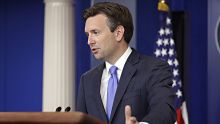A funny thing happened on the way to Monday's mid-year economic and fiscal outlook (MYEFO) – Treasurer Scott Morrison discovered there is both good and bad government debt.
Congratulations are in order as it represents a major break with the Abbott/Hockey dogma of all government debt being evil.
More BusinessDay Videos
ScoMo discovers good debt
It would be a good thing for the country if the government followed through on its good debt/bad debt epiphany. Michael Pascoe comments.
Unfortunately, ScoMo's epiphany is a bit late and its proclamation rather half-hearted.
Despite acknowledging the benefit of using "good" debt to invest in infrastructure, Morrison said he wouldn't be pursuing it until all the "bad" debt was under control. That could be some time.

And during that time and beyond, pray Australia doesn't need some quick fiscal assistance as Morrison says there won't be any.
So, if the Treasurer doesn't believe in stimulatory spending and still doesn't want to take the advice of Reserve Bank governors past and present and the vast majority of other economists to get borrowing and investing, why suddenly trot out the good debt/bad debt story a few days before MYEFO?
The answer might be in the audience he was really aiming at – the ratings agencies, not the banking and finance conference where he delivered the speech.
The federal budget six months ago forecast net commonwealth debt would rise to the equivalent to 19.2 per cent of GDP next financial year. Depending on the balance of improved commodity prices and flat wages growth, there's a fair chance Monday's MYEFO will see an upgrade of that number to 20 per cent.

That's nearly double what it was back when Hockey was shadow treasurer and proclaimed a little hysterically that Australia had "a budget crisis". The coalition, after three years in power, doesn't talk like that about debt anymore.
With the odd ratings agency getting restive about maintaining our AAA credit rating, Morrison wants to hose down their fears of the government not having a genuine plan to turn around its debt truck.
For seven consecutive budgets, various Australian treasurers have promised our debt would rise for just another year or two and then start falling as a percentage of GDP. The agencies are still waiting for it to happen.
It's one thing now to tell the party faithful cutting company taxes by $50 billion will solve all our problems, it's another to convince the ratings mob.
The impact of a ratings agency or two knocking us down to AA+ tends to be exaggerated, but it would nonetheless be embarrassing for the government. Blame the opposition all you like, at some stage the government has to accept responsibility for governing.
In August, Ross Gittins flagged the good debt/bad debt option as a means for Morrison to downplay the supposed problem. The message has taken a while to get through.
The problem remains whether Morrison has the credibility to sell that message.
Our debt level per se is not a reason to lose AAA status. There are other members of the AAA club that have higher debt ratios. The difference is that the ratings agencies think their governments' economic management is more credible.
Hence, even while accepting the good debt story, Morrison over the past week has hedged his bets on the doctrinaire side. For that reason, we have good reason to hope the economy doesn't suffer a negative external shock on Morrison's watch.
In an interview with Fairfax Media, Morrison vowed he would never borrow money to blow "on a sugar hit stimulus" even if there were another crisis.
"We just don't contemplate those sorts of initiatives because you don't double down on failure on those sorts of things," he said.
"There is no evidence to suggest that it's necessary and indeed when it was done last time, I believe the consequences were seriously negative for the Australian economy and is the key reason they built up the debt bomb that we have now.
"Its timing and construction was an economic catastrophe."
There are plenty of august individuals and institutions who think otherwise. You could start with the RBA, OECD, IMF and keep counting.
Rather than being a failure, the $900 cheques and the school sheds (though not the pink batts) could well be the most successful example yet of Keynesian stimulus helping head off a recession.
The interview indicates it was no accident Treasury commissioned an odd paper by an economist with fringe theories on fiscal stimulus. The paper's conclusion was known before it was commissioned as the author had written such stuff numerous times for a well-known anti-Labor publication and in a report for the Minerals Council. The Treasury itself had thoroughly debunked the heresy back in 2014.
Yet ScoMo supports this extreme minority view. As ridiculous as it sounds, it looks like we have an anti-Keynesian in charge of Treasury, a Treasurer who effectively claims to be to fiscal policy what Senator Malcolm Roberts is to climate science.
So congratulations for the discovering good and bad debt have to be qualified as it's not entirely clear if Morrison really believes it. If he did, you might think he would be acting on it. It's that credibility thing.
















0 comments
New User? Sign up